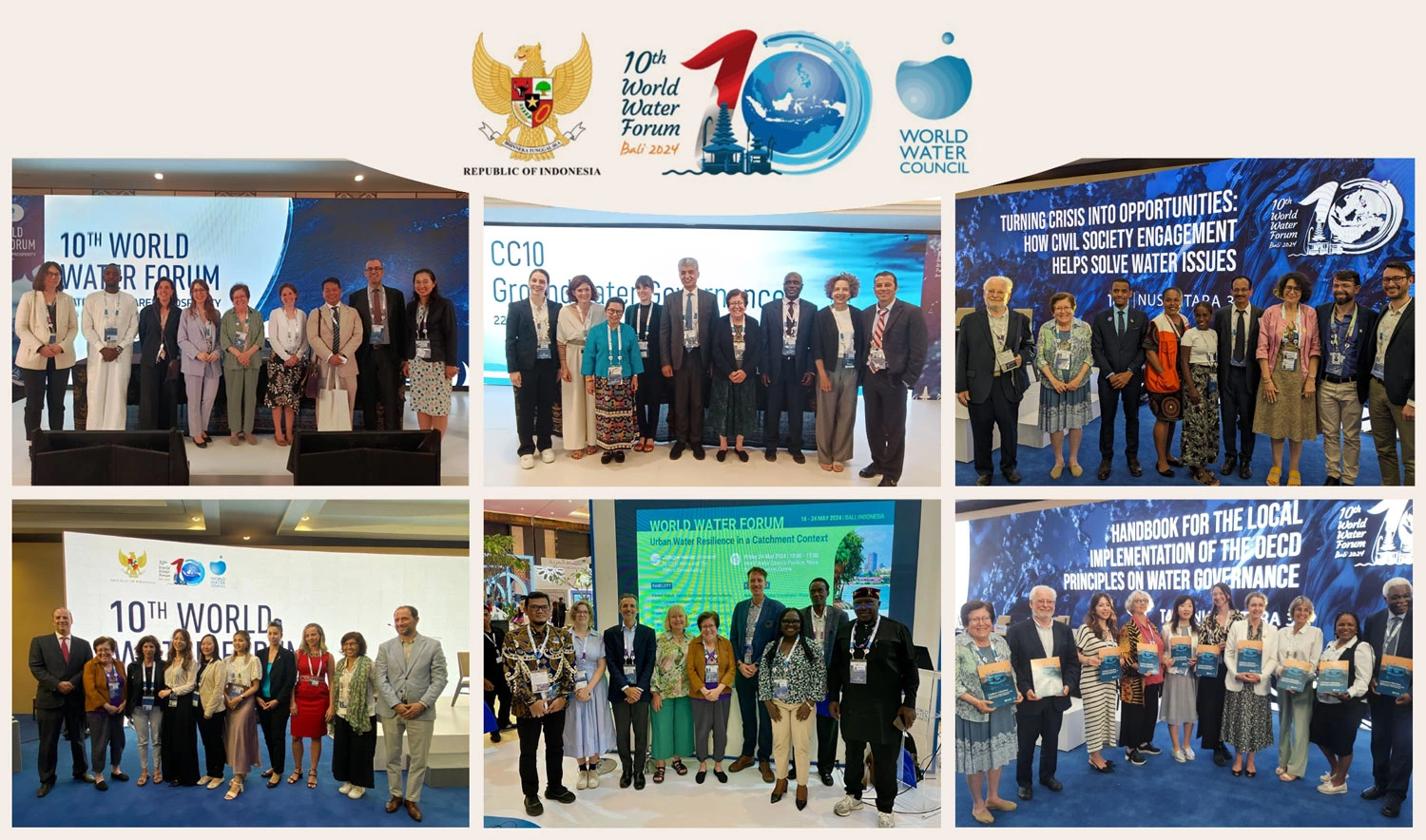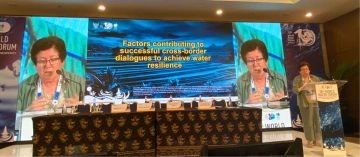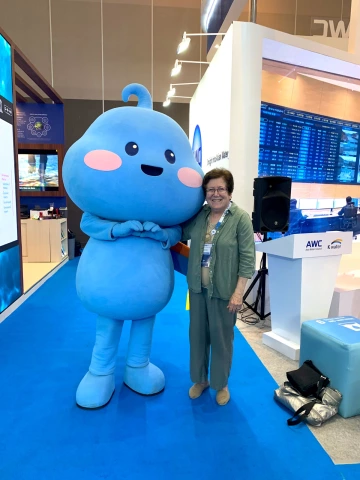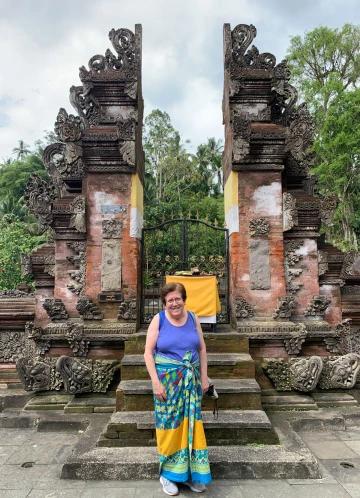
Water for shared prosperity was the theme of the 10th World Water Forum, which was held May 18–25 in Bali, Indonesia. My work has taken me to Europe and the Near East, but this was my first visit to Indonesia. A country of over 17,000 islands and more than 275 million people, it is the world’s fourth most populous country, after China, India, and the United States. Participating in this large triennial water conference along with an estimated 15,000 attendees enabled me to share information and insights from my work in Arizona, the Colorado River Basin, and the US-Mexico border region and to learn about the work being done on water issues of other regions. It also enabled me to visit some special people and places in Bali. More on this is at the end of this essay.
The President of Indonesia, Joko Widodo, officially opened the Forum with a speech that highlighted collaboration and inclusive engagement. My participation echoed the president’s remarks in emphasizing these two important practices.

Delivering comments to session, Monday, May 20, 2024, Transboundary and Cross-Sectoral Dialogue for Peace and Water Resilience
My busy week included speaking in six sessions, as mentioned in the May 24, 2024, Reflections about my path to the World Water Forum. The sessions occurred in this order: (1) Transboundary and Cross-Sectoral Dialogue for Peace and Water Resilience, (2) Groundwater Governance, (3) Turning Crisis into Opportunities: How Civil Society Engagement Helps Solve Water Issues, (4) Handbook for the Local Implementation of the OECD Principles on Water Governance, (5) Urban Water Resilience in a Catchment Context, and (6) The Role of Science for Building Capacity and Dialogue Across Transboundary Basins. (Group photos from each session are shown above in clockwise order starting from the upper left.) All the sessions, except number 5, were officially scheduled World Water Forum sessions, while number 5 was held at the Expo hall booth of the forum organizer, the World Water Council. My remarks at all sessions connected to water governance, policy, and management in Arizona and the Colorado River Basin region.
The session, Transboundary and Cross-Sectoral Dialogue for Peace and Water Resilience, provided the opportunity for me to introduce a case study focused on the International Boundary and Water Commission’s work on Colorado River Basin cooperation and its facilitation of the Transboundary Aquifer Assessment Program, which is included in a handbook on water diplomacy, currently in press. I discussed factors that contribute to the success of cross-border dialogues to achieve water resilience. These factors include: a functioning mechanism for cooperation that includes knowledge co-production; mutual respect contributing to trust; inclusive involvement of interested parties (stakeholders); good communication; persistence and patience; eating with your partners; and leadership. I also spoke about the value of transparency.

May 20, 2024, at the World Water Forum Expo
During the session on groundwater governance, my remarks on the Transboundary Aquifer Assessment Program emphasized the binational collaboration that led to development of a common understanding of aquifer and groundwater conditions along the Arizona-Sonora border. The session, organized by UNESCO and others, involved many people who have worked intensively on increasing the visibility of groundwater, including at these sorts of international dialogues, where surface water tends to be the focus. We agreed that it is time to stop talking to each other and to speak more with those less familiar with the vital importance of groundwater to so many communities and individuals.
In the session on the importance of civil society in turning crisis into opportunity, I had the honor of introducing the session topic. I enjoyed digging into the meaning of the words in the three session objectives, which were to (a) examine different crises affecting water and consider what stakeholder engagement may be required to enable appropriate responses in different contexts, (b) focus on the role of different stakeholders, especially civil society, in water governance during times of crisis, and (c) share good practice and examples of civil society engagement in addressing water-related crises. I emphasized how engagement and consultation has improved in the Colorado River Basin, pointing to the greater involvement of Native Nations in federal and state consultations, along with the efforts of the International Boundary and Water Commission. Fortunately, the audience had the opportunity to hear directly from US IBWC Commissioner Maria-Elena Giner about IBWC engagement practices. Speaking to the distinction between expert stakeholders and the general public, I noted that a key theme of my personal outreach and engagement is that everyone is a water stakeholder. We need all hands on deck to address water challenges!
The next session, organized by the Organisation for Economic Co-operation and Development (OECD), celebrated the release of the publication A Handbook of What Works: Solutions for the Local Implementation of the OECD Principles on Water Governance, which can be accessed at this link. As a participant in OECD’s Water Governance Initiative since its 2013 inception, I contributed information for Case Study 9 (page 27), “A transboundary water restoration agreement.” The short write-up discusses the Colorado River Delta restoration efforts in the context of water governance principles. The session’s panel discussion highlighted the principles relating to acquiring and sharing data and information and to innovative governance, as well as stakeholder engagement, including the involvement of NGOs and university researchers.

Tirta Empul Temple
The session on urban water resilience was organized by ICLEI (a global network of local governments for sustainability) and The Nature Conservancy. I appreciated this opportunity to speak about the City of Tucson’s water management efforts. My talk covered how Tucson moved from being one of the largest cities in the world dependent on mined groundwater to one that no longer overdrafts groundwater, and acquainted a global audience with the city’s recently announced One Water 2100 Plan. Though the concept of One Water is getting a lot of attention in the United States, the “One Water” nomenclature seemed less familiar to those from other parts of the world.
My final official contribution was to the discussion session on the role of science in building capacity and enhancing dialogue in transboundary settings. My presentation focused again on the Transboundary Aquifer Assessment Program and the six principles of agreement included in the three-page “Joint Report of the Principal Engineers Regarding the Joint Cooperative Process, United States–Mexico, for the Transboundary Aquifer Assessment Program,” which can be found here. The principles establish the framework for collaboration, while preserving the water governance and management sovereignty of each country. I noted, however, that while the cooperative framework does not contemplate binational groundwater management, a recently published paper by a binational group working outside of the program’s official efforts explores preconditions for crafting binational groundwater agreements. (See Mumme et al.)
Though speaking at these sessions, attending other sessions, and meeting with people kept me very busy, I did manage to enjoy some of Bali’s special culture. Friday’s closing cultural night celebration featured delicacies from different parts of Indonesia and live entertainment, including a band for which Indonesia’s host for the evening, Minister of Public Works and Public Housing Mochamad Basuki Hadimuljono, played drums on many of the songs!
Bali’s history of honoring the sacredness and importance of water is told through its many water temples, some of which I visited. While visiting the Jatiluweh rice fields, a UNESCO World Heritage Site, I spoke with rice farmer Wayan S., who explained that climate is affecting water availability and the rice production of Balinese farmers. The visit was made possible by networking, the topic of my May 24 Reflections. UArizona colleague Larry Fisher connected me to his daughter-in-law, whose research focuses on Jatiluweh. She connected me to a former student and the rice farmer’s nephew, with whom I had the pleasure of spending the two days exploring Bali.
I am grateful that I had the opportunity to participate in the 10th World Water Forum, learn about Bali’s rich history and water practices, and interact with so many gracious people.

